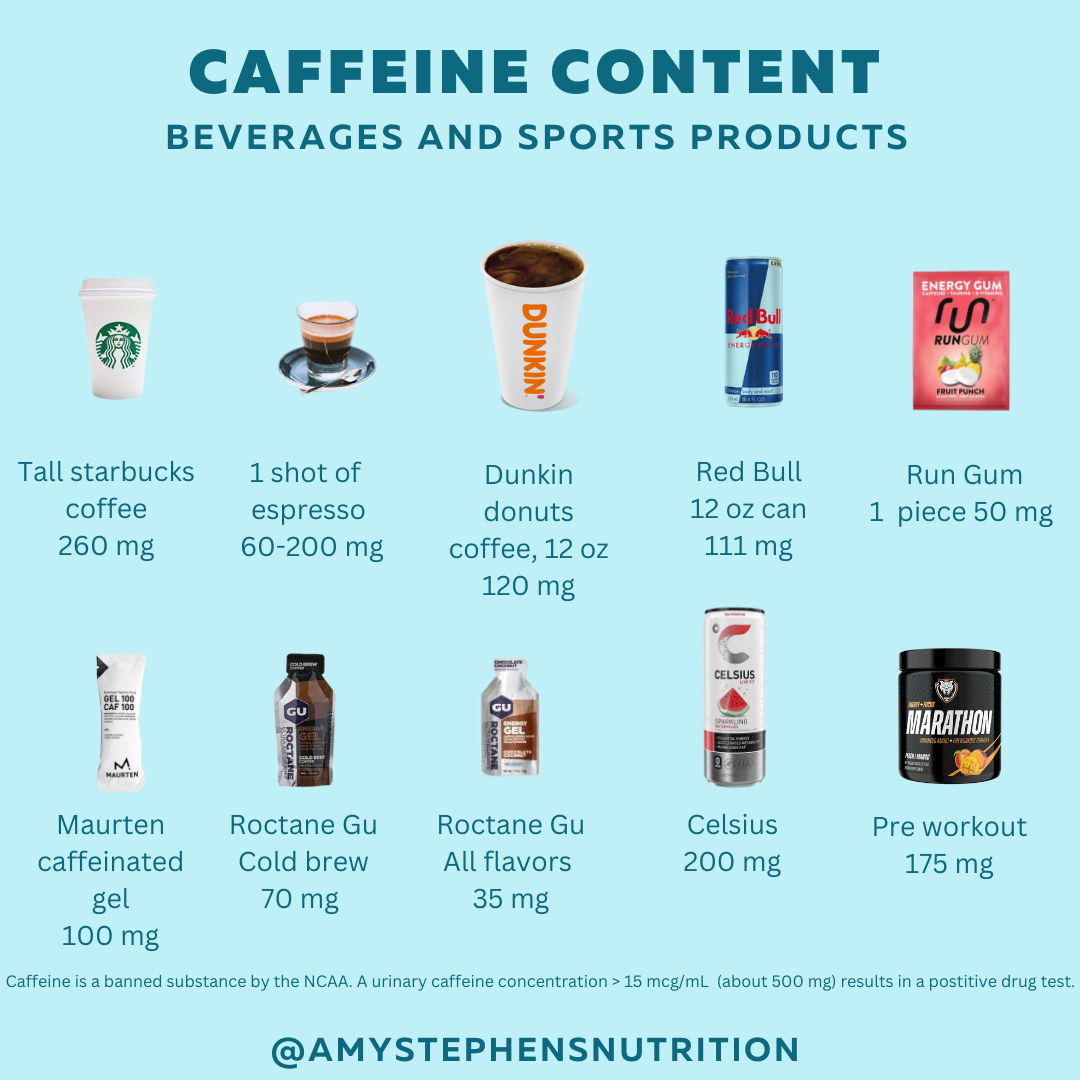Amy Stephens
MS, RDN, CSSD, CEDS
Licensed dietitian
specializing in sports nutrition
and eating disorders
MS, RDN, CSSD, CEDS
Licensed dietitian
specializing in sports nutrition
and eating disorders
Studies have shown an improvement in sports performance when caffeine is consumed before exercise (Clarke, 2018). Here are details about how caffeine works and the safe and effective dose that yields the best results.
How it works:
Caffeine blocks adenosine receptors that, in turn, prevent you from feeling tired. By blocking adenosine receptors, you can feel less pain, increase neuro-excitability, and improve your ability to focus which can lead to ergogenic effects on exercise performance.

Benefits:
Risks:
Effects of too much caffeine can cause jitteriness, shakiness, upset stomach, or reflux. None of these symptoms are ideal before or during a race. Be sure to test out caffeine dose and response before race day.
Dose:
The effective dose of caffeine is 3-6 mg/kg about one hour before competition which is approximately 200-400 mg for a person weighing 150 pounds (70kg) which is equivalent to a tall coffee from Starbucks.
There is a bigger performance benefit when caffeine is reduced prior to competition (Beaumont).
Form:
The amount of caffeine in energy bars, gels and medications tends to be standardized, while the amount in coffee and tea can vary considerably. Be sure to read labels and know how much you are consuming.
Some energy drinks or pre-workout beverages might have caffeine listed as one of these ingredients:
Green tea extract
Guarana
Guayaki yerba mate
Guayusa
Cola nut
Cacao

College athletes:
Caffeine is a banned substance by the NCAA. A urinary caffeine concentration exceeding 15 micrograms per milliliter (corresponding to ingesting about 500 milligrams, the equivalent of six to eight cups of brewed coffee, two to three hours before competition) results in a positive drug test.
* Caffeine content varies among brewing methods. See chart below.
Olympic level athletes:
Caffeine is permitted in sports governed by the World Anti-Doping Agency (WADA).
Food-first approach:
The perception of having increased energy from caffeine will not replace the actual energy provided from food. Successful athletic performance is dependent on a nutrition plan that meets your energy and nutrient needs through food first. Caffeine can be used to improve performance and will be most effective if energy needs are met with food-first.
References
Beaumont R, Cordery P, Funnell M, Mears S, James L, Watson P. Chronic ingestion of a low dose of caffeine induces tolerance to the performance benefits of caffeine. J Sports Sci. 2017 Oct;35(19):1920-1927. doi: 10.1080/02640414.2016.1241421. Epub 2016 Oct 20.
Clarke ND, Richardson DL, Thie J, Taylor R. Coffee Ingestion Enhances 1-Mile Running Race Performance. International Journal Sports Physiology and Performance. 2018;13(6):789-794.
Davis JK, Green JM. Caffeine and anaerobic performance: ergogenic value and mechanisms of action. Sports Med. 2009;39:813–832.
Laurent D, Schneider KE, Prusaczyk WK, et al. Effects of caffeine on muscle glycogen utilization and the neuroendocrine axis during exercise. J Clin Endocrinol Metab. 2000;85:2170–2175.
McLellan TM, Bell DG. The impact of prior coffee consumption on the subsequent ergogenic effect of anhydrous caffeine. Int J Sports Nutr Exerc Metab. 2004;14:698–708.
Spriet LL. Exercise and sport performance with low doses of caffeine. Sports Med. 2014;44:175–184.
Talanian JL, Spriet LL. Low and moderate doses of caffeine late in exercise improve performance in trained cyclists. Appl Physiol Nutr Metab. 2016 Aug;41(8):850-5.
Wiles JD, Bird SR, Hopkins J, Riley M. Effect of caffeinated coffee on running speed, respiratory factors, blood lactate and perceived exertion during 1500-m treadmill running. Br J Sports Med. 1992; 26:116–120.
Licensed dietiTian
specializing in sports nutrition and eating disorders
© Amy Stephens Nutrition
SITE BY 744 CREATIVE